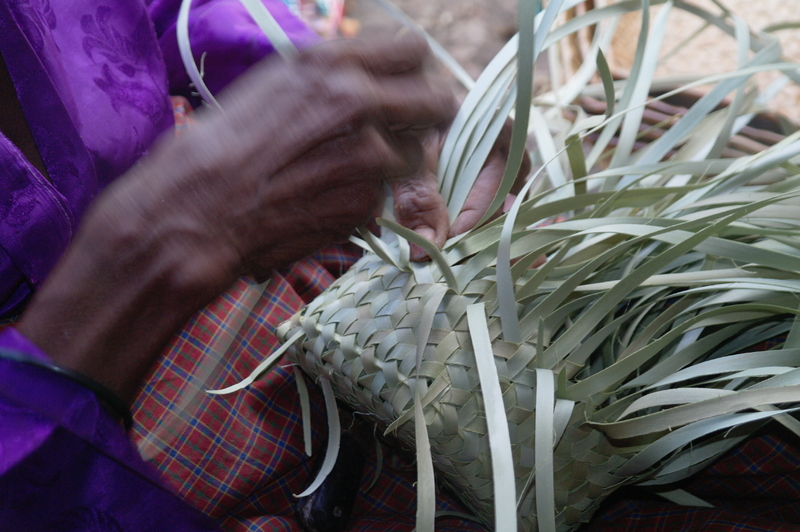Dublin Core
Title
Leu Hina Fa'i (naha taka hodi rai sasán; palm leaf baskets) - Aldeia Ioro
Subject
Membru communidade feto sira koalia konaba no hatudu oinsa atu homan leu hina fa'i.
Women in the community talk about and demonstrate how to weave storage baskets.
Women in the community talk about and demonstrate how to weave storage baskets.
Description
TETUM
Nian fa’i oi-oin sasán ne'ebé soru ho ai-tali. Sasán soru sira-ne'e inklui leu hina (taka hodi rai sasán); pari pari hina (kakehe); neru moko hina no leu hina (luhu atu hamoos foos); meci leu moko hina, (luhu atu kaer meci); likas hina, (luhu boot); rai soko hina (hanesan dabu); no ulu halivan hina (hanesan oko ki'ik hodi rai husar-talin).
ENGLISH
Across Lautem a number of different styles of basketry weaving can be found, largely in communities with access to the kind of palm leaf needed. Palm basketry is most plentiful in coastal areas, where palm trees grow. To prepare palm leaves for weaving, palm leaves are cut straight and left to dry in the sun then are woven to form baskets. Baskets are used for various purposes, to store meat and food for traditional ceremonies, and when travelling or for collecting food from gardens or forests.
Leu hina fa’i are palm baskets woven into many different forms. To make these baskets, lontar palm fronds are collected from palm trees, and the leaves are cut into thin, straight strips. In Malai Lada, sub-district Lautem, and Vailana, sub-district Lospalos, palm leaves are left attached to the fronds. Four fronds are used to weave long dilly bags with a handle to be worn slung over ones back. The end of the fronds forms the base of the dilly bags, which are interwoven to form a mutually reinforcing base. The leaves of the fronds then form the sides. In Ioro, sub-district Tutuala weavers made smaller, more delicate baskets with a base made of thin palm leaves that had been cut from the palm fronds.
Nian fa’i oi-oin sasán ne'ebé soru ho ai-tali. Sasán soru sira-ne'e inklui leu hina (taka hodi rai sasán); pari pari hina (kakehe); neru moko hina no leu hina (luhu atu hamoos foos); meci leu moko hina, (luhu atu kaer meci); likas hina, (luhu boot); rai soko hina (hanesan dabu); no ulu halivan hina (hanesan oko ki'ik hodi rai husar-talin).
ENGLISH
Across Lautem a number of different styles of basketry weaving can be found, largely in communities with access to the kind of palm leaf needed. Palm basketry is most plentiful in coastal areas, where palm trees grow. To prepare palm leaves for weaving, palm leaves are cut straight and left to dry in the sun then are woven to form baskets. Baskets are used for various purposes, to store meat and food for traditional ceremonies, and when travelling or for collecting food from gardens or forests.
Leu hina fa’i are palm baskets woven into many different forms. To make these baskets, lontar palm fronds are collected from palm trees, and the leaves are cut into thin, straight strips. In Malai Lada, sub-district Lautem, and Vailana, sub-district Lospalos, palm leaves are left attached to the fronds. Four fronds are used to weave long dilly bags with a handle to be worn slung over ones back. The end of the fronds forms the base of the dilly bags, which are interwoven to form a mutually reinforcing base. The leaves of the fronds then form the sides. In Ioro, sub-district Tutuala weavers made smaller, more delicate baskets with a base made of thin palm leaves that had been cut from the palm fronds.
Creator
Many Hands International
Source
Preservation of Endangered Forms of Intangible Fataluku Cultural Expression Project
Date
Recorded 24.04.2013
Rights
Video, photo and text rights: Many Hands International
Language
Fataluku
Coverage
Aldeia Ioro, Suku Tutuala.
